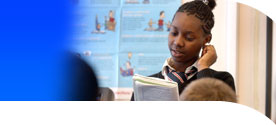



RE helps to create successful learners because it creates opportunities for increasingly skilled interpretation of sources and texts, for asking questions about truth and meaning and for communicating ideas accurately and respectfully.
The ability to work on reflecting, analysing, interpreting and evaluating sources, questions, practices or ideas is central to RE. Students are able to engage creatively with their own and others' questions about truth, meaning, purpose, identity, values and commitments. This motivates and empowers them in successful learning.
By investigating beliefs and teachings, explaining practices, evaluating answers or analysing ideas, students can enhance their skills and confidence as individual learners coming into contact with new spiritual or moral concepts.
By applying vocabulary, explaining commitments, interpreting sources or evaluating beliefs, students can enhance their skills and confidence as group learners working with others to give expression to their understanding and response.
RE helps to create confident individuals because it encourages young people to develop their ideas and express them appropriately as they learn more about themselves and others.
As young people use the ideas and practices of belief systems to develop their own sense of identity and belonging, they are helped to understand more about themselves and how to communicate.
By explaining and evaluating beliefs, reflecting on ultimate questions and expressing ideas, students can enhance their sense of their own ability to deal with challenges. These processes also strengthen students' self-esteem and empower them to take decisions with increasing autonomy.
RE helps to create responsible citizens because it raises issues of local and global concern, placing them in a spiritual and moral context.
By raising and considering issues, students develop themselves as citizens in a plural society and global community with a strong awareness of religious and moral diversity and its impact on society and individuals.
By evaluating ethical issues, and expressing views using reasoned arguments, students can enhance their capacity and desire to make a positive contribution to debates and decisions in society.